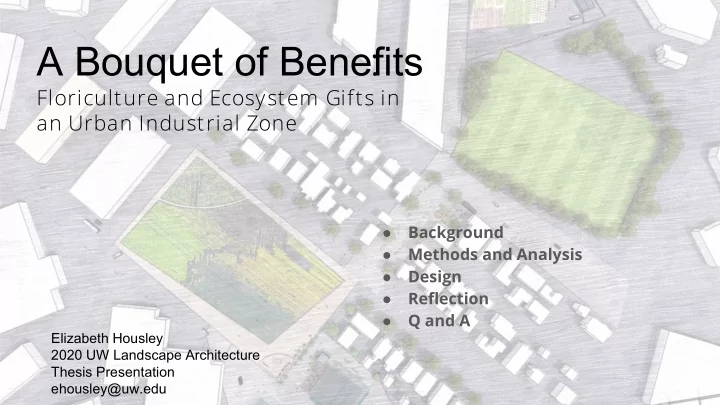

: A Bouquet of Benefits Floriculture and Ecosystem Gifts in an Urban Industrial Zone Background ● Methods and Analysis ● Design ● Reflection ● Q and A ● Elizabeth Housley 2020 UW Landscape Architecture Thesis Presentation ehousley@uw.edu
Guiding Questions Does phytoremediation research data from field- applications of ornamental species support the possibility of offsetting remediation costs with cut- flower profits? And then, how would a proposed “Flower District” in Seattle’s Georgetown neighborhood provide an economic and social structure for a “phyto-to-market” system while improving surrounding ecosystem health?
Design Research: Early Investigations Diagramming ● Mapping ● Walking Interviews ● Tactile Analysis ● Data Analysis ● Modeling ● Rendering ● What do floral farmers think about a Experiencing ● phyto-to-market system? Synthesis ● Public perception of the pollinator benefits from floral industry is • needed Increased public knowledge of the mental health benefits of floral • products is needed Phyto Flowers must be marketable and desired • Customer surveys must be done to know desire • Would customers pay more for phyto flowers? Info needed. • Urban phyto floral farmers should receive a tax subsidy • Flowers must be pollinator friendly • Hardy urban plants require little or no Irrigation •
8 of 10 Wholesale Floral Warehouses are in Georgetown 1. PNB Building: PAH, Pb, Hg, 2. American Dry Ice Orcas: TIER2 3. Pioneer Enamel Manufacturing: Cd, Cr, Pb, Zn 4. Sonn Property: PAH, BETX 5. Mail Dispatch: PAH
Design Research: Site Investigations Diagramming ● Mapping ● Walking Interviews ● Tactile Analysis ● Data Analysis ● Modeling ● Rendering ● Experiencing ● Synthesis ●
Proposed Phyto-to-Market System
Resource Exchange 2
Phytoremediation 1 Demonstration Garden
Click to view online video
Phytoremediation 1 1 Demonstration Garden: Phyto-to-Market Testing
Phytoremediation 1 1 Demonstration Garden: Circulation and Gathering Space
2 1 Urban Floral Farm Start-Up Click to view online video
Urban Floral Farm: 1 2 Example Species Market potential Tolerates contamination Stores contamination in roots Adequate root depth Cut-flower products: organic contamination only Byproducts: heavy-metal ok
1 3 Pedestrian and Pollinator Pathways 1 1 1 2
Ex-Situ Indoor Greenhouses and 4 4 Byproduct Manufacturing
4 4
Compost Facility 1 5 and the Floral Waste Cycle
1 1 Phytoremediation Demonstration Gar 2 1 Urban Floral Farm Start-Up 3 1 Pedestrian and Pollinator Pathway 4 1 Ex-Situ Fill + Byproduct Sites 5 1 Compost Facility
Reflection • Value of design collaboration • Floral industry response to Covid-19 • Relevance to landscape architecture and remediation firms Thank you for this opportunity! Elizabeth Housley ehousley@uw.edu : A Bouquet of Benefits Floriculture and Ecosystem Gifts in an Urban Industrial Zone
Recommend
More recommend